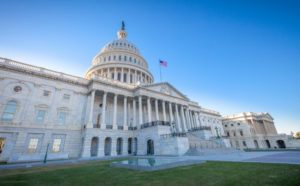The House’s new bipartisan Future of Defense task force will release a report following its six-month tenure that will likely include recommendations on ways the Pentagon can more effectively innovate for the future and proposed legislation to capture emerging technologies.
Reps. Seth Moulton (D-Mass.) and Jim Banks (R-Ind.), co-chairs of the task force, told reporters Tuesday the new group allows lawmakers to broaden beyond the House Armed Services Committee’s near-term focus on the next 12 months to ensure the Pentagon is prepared for defense innovation challenges over the next 30 years.

“Our job here is about oversight and pushing the Pentagon in the right direction. I have no doubt, with how this task force was launched, that we will get to the heart of some key issues,” Banks said.
HASC leadership announced the task force’s activation last week, and the new group is set to hold its first hearing on Oct. 29 (Defense Daily, Oct. 18).
Moulton didn’t cite specific witnesses the task force will hear from, while noting that lawmakers must bring in “outside-the-box thinkers” and industry from Silicon Valley for both briefings and future hearings.
“There’s no question that the model has changed. Innovation is no longer just coming from big government contracts. The United States has to be smarter about adapting to this new world,” Moulton said.
During the group’s six-month tenure, the co-chairs said they intend to focus on challenges to innovating in specific technology areas, including artificial intelligence, biotechnology and hypersonics.
“One of the fundamental questions that we have to ask is why, although Congress has enabled the Pentagon to change its personnel policies and create more innovative structures, we haven’t seen them used very much. We haven’t seen a lot of innovation actually come out of these reforms. Those are the kinds of questions that we have to ask,” Moulton said. “It’s not about saying ‘well, this weapon system is too old, we should get rid of it and replace it with this.’ It’s much more broadly saying how we do we get the Pentagon to be continually and effectively asking these questions.”